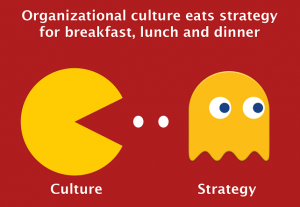The success of a project is certainly due in part to the skills and training of the project manager as well as the scaleable measuring tools used to gauge progress. However, in this Tech Republic article, author Tom Mochal makes the point that regardless of how well-equipped a project manager is, the success of an initiative rises and falls in part due to the existing organization culture. How does culture influence a project? Perhaps the organization has a history of starting projects and not seeing them through to the end. Over time this could develop a pessimistic careless attitude among employees towards the introduction of new initiatives. The organizational structure matters as well, dictating how, where, and when people spend their time at work on a project. Mochal notes that while structure can change, culture is nearly impenetrable in the short run. This brings to mind the case we just discussed in class with an employee pulled between two task forces. Multitasking rarely improves a process, but rather splits attentions to 50% “power.”
I have personally experienced the roadblocks of inbred organizational cultural mentalities, especially the lack of compliance and urgency in the final stages of project implementation. My volunteer team was working to analyze the supply chain (and reduce costs) of a bakery whose proceeds were largely donated to a cause. The bakery was financially in the red and had been for years, but the first priority was always the cause; this was evident when you talked to the employees. In fact, the bakery had never undergone a full financial analysis. The request for the project came from top management and we met with them to discuss the project scope and timeline. However, as we began to search for the data necessary to complete our initial analysis, we met resistance from middle management who vocalized their doubts about the project. They had seen other projects start and fail numerous times and were not willing to invest the time to see this project succeed. The top management and middle management additionally had not engaged in any communications concerning the project. When we met with middle management to ask for the data, it was the first time they had heard of the project and would not relinquish the data to us initially. These are only a few examples of our representative experience with the bakery, but it does serve as a poignant reminder that as a project manager, you can have the skills, the tools and the vision, but without the support of the people within the organization who will be affected by your project implementation, every step you take will be in vain.
Have you experienced or witnessed a great project fail in your organization? Why did it fail? How did the existing organizational culture play a part? Or vice versa, do you have an example of an organization culture that sped up the timeline of a project’s implementation? How did it complement the project initiatives?


I could really relate to this post. In my last company, our projects were not respected. They were more large scale ideas from our manager that never got put into action. We didn’t have the resources for a lot of things, and everyone learned to not get their hopes up when he mentioned these cool things he wanted for the office. Our culture was very laid back and we were just a start up with 20 or so employees at the time. Whereas in my current office, projects are respected by upper management. We have about 470 employees and a bunch of project managers on staff. We have the resources and they are extremely vetted before they are put into action. The only issue is getting everyone to stay on top of their individual tasks! But at least they are getting started. I can see both sides now and can see where projects don’t get lift off.
Hi Emily,
Thank you for sharing this article, I found it very interesting as I can relate to some of the struggles in seeing a project from beginning to end. I have been a part of some projects that didn’t have an ideal progression and implementation. The projects failed because of lack of commitment from sponsors and stakeholders. Other projects took priority and others got lost in the shuffle. The outcome was very demotivating for the individuals that had spent a lot of time working on the projects. Our organizational structure plays a big role in the selection of projects throughout the organization as half of the employees are somehow related. I ask myself daily- why do I still work there?
You provide some great insight here Emily into pitfalls of project management. I have not personally seen issues with bad organizational behavior affecting projects negatively, but I can imagine where this would be a serious problem. If you cannot get support from upper management you are almost destined to fail. Most organizations are top down making it difficult for employees to not follow the initiatives and drive provided from upper management. As Vel points out above, many of the potential downfalls on projects can be attributed to poor viability and support. I am glad to hear that in your office you get the proper level of support on projects from management. Now that you have seen both sides of this, you can see clearly how important organizational behavior is to project management.
Emily, I definitely relate to your cultural dilemma and how it negatively impacted a company project. Executive management had decided in the midst of a large acquisition to go through with an enterprise overhaul of the current accounting system. The project goal was to implement the new system in two phases. The culture was that current employees would take on the additional work, while some of their colleagues were being reorganized or laid off in the new organizational structure. The project failed after the first phase completed, and the second phase stopped, because executive management was changed in the midst of the project. From the start of the project, the culture was not evaluated at all to see if the employees would be able to accommodate the work breakdown structures or timelines. Then, the culture changed in the duration of the project, making it that much more challenging. The project is on a stall as the system will be replaced by a third accounting system instead.
Emily great article with great insight. Understanding the culture of a company is vital. Decisions in executive management can really hurt a project. Management always changes, ideas change as well. When creating projects phases must be followed effectively completing each checkpoint, understanding if employees can match the breakdown of the timeline stated for the project. You don’t want to give a project manager too little time to complete an large project. Failure will occur if the project manager doesn’t act accordingly and effectively. If the culture of a project is changed during the project, this project will be in danger and held high at risk.